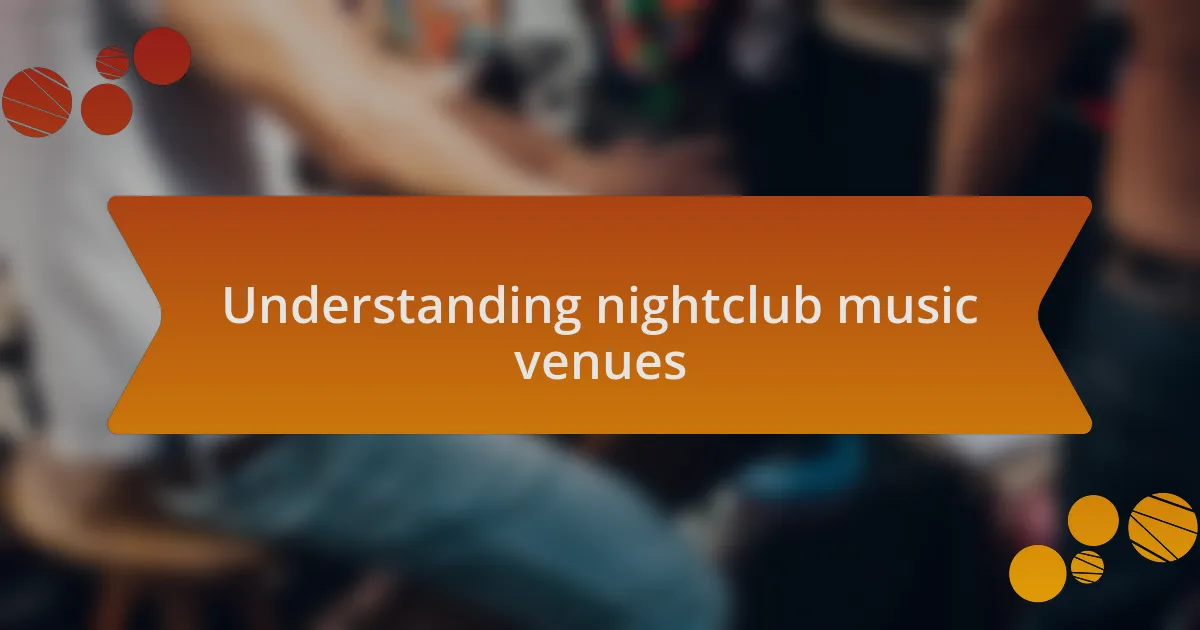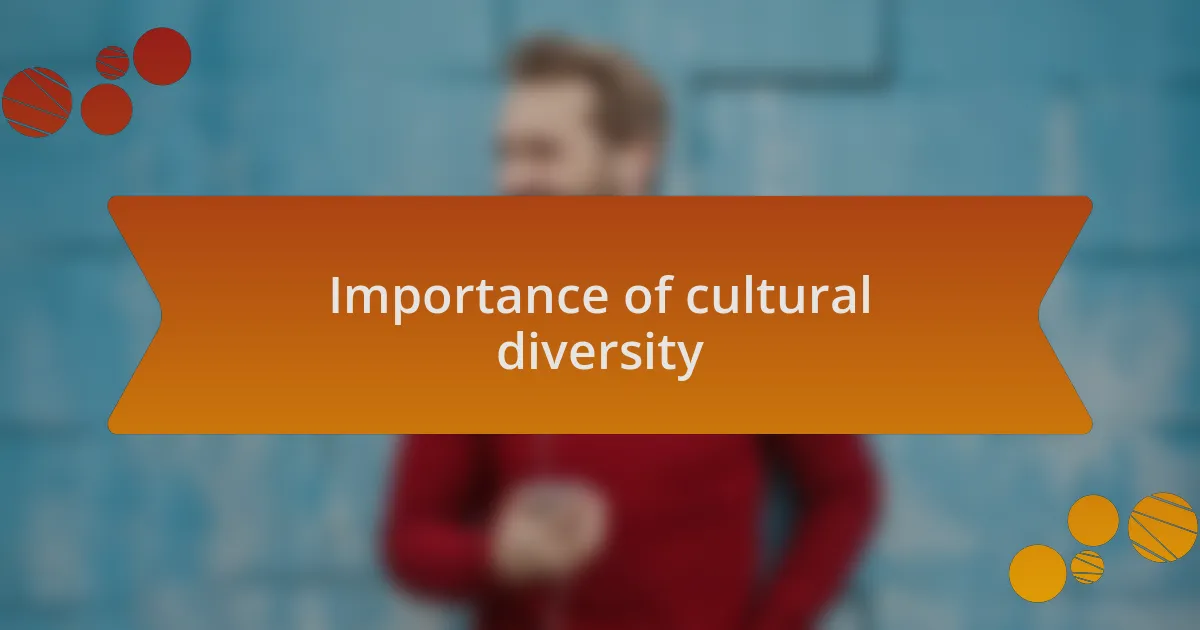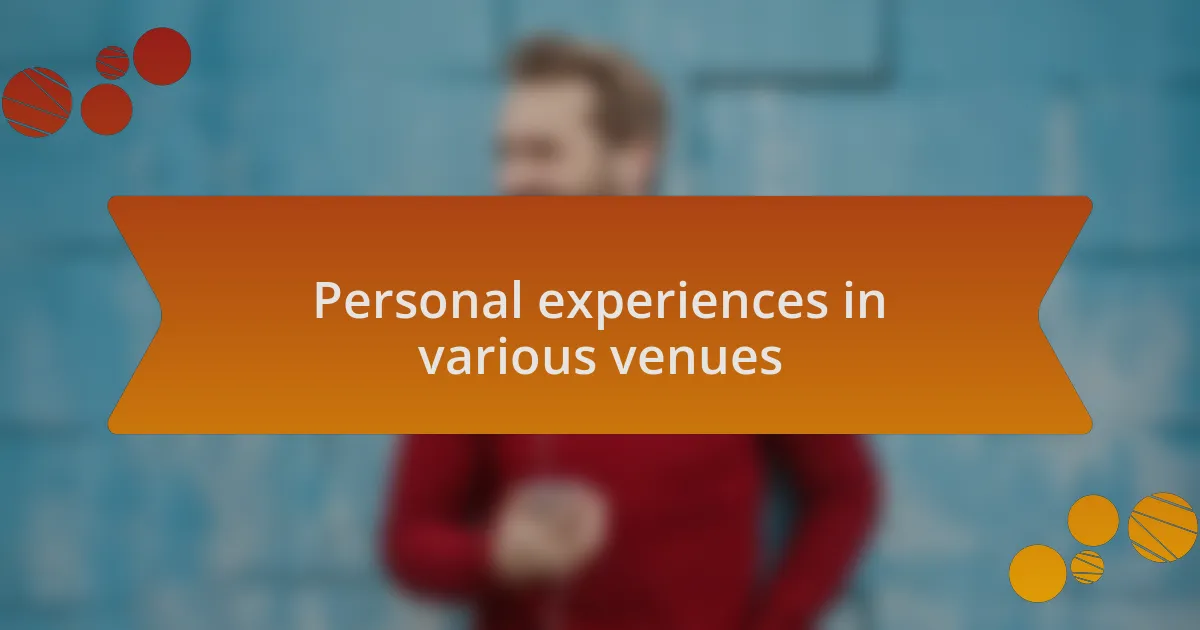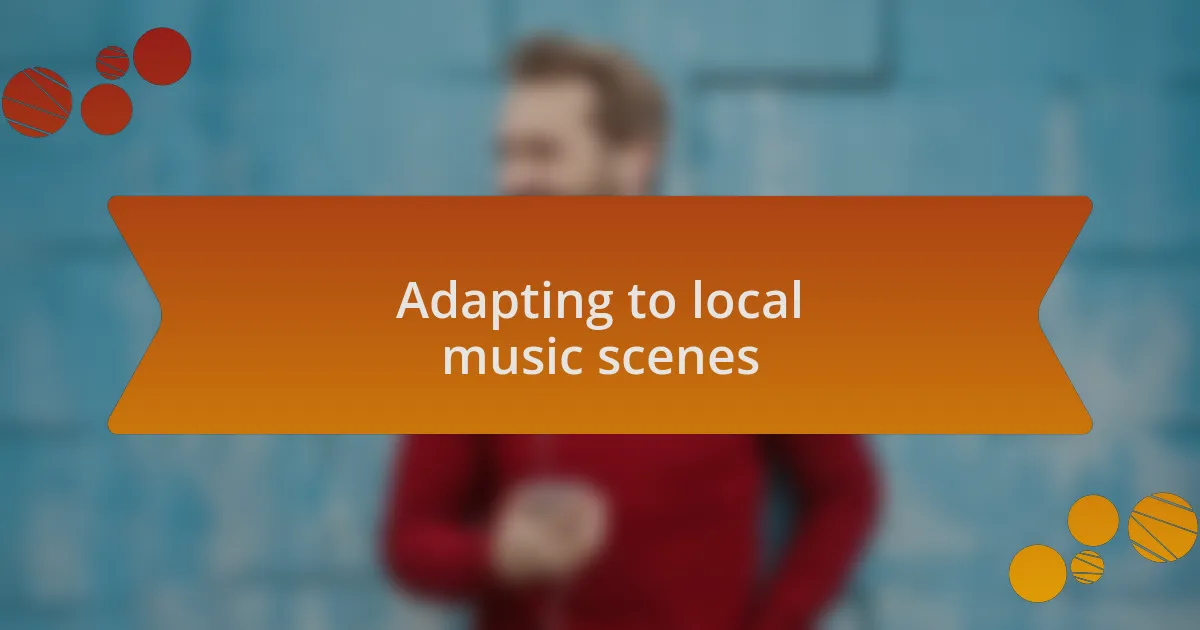Key takeaways:
- Nightclub music venues are cultural hubs that foster connections through music, reflecting the community’s vibe and allowing for personal discoveries.
- Cultural diversity enhances nightlife, sparking creativity and building community as patrons share experiences and backgrounds.
- Personal experiences in different venues highlight how music can bridge cultural gaps and create intimate connections among strangers.
- Adapting to local music scenes involves understanding cultural nuances and engaging with the audience, transforming the experience for both performers and patrons.

Understanding nightclub music venues
Nightclub music venues are more than just places to dance; they are cultural hubs that reflect the community’s heartbeat. I remember stepping into a small club in Berlin, where the pulsating techno music resonated in my chest, making me feel both exhilaratingly alive and utterly connected to the vibrant scene around me. Isn’t it amazing how music can transcend language and cultural barriers, creating a shared space for everyone?
These venues often embody the local vibe, showcasing not just popular tracks but also regional sounds that tell a story. In my experience, attending a local DJ’s set in an underground venue can feel like a rite of passage, deepening my appreciation for the cultural roots that shape the music. Have you ever felt that rush of discovery when you stumble upon a unique sound that resonates with you on a personal level?
Moreover, the layout and atmosphere of a nightclub influence how we connect with the music and each other. I’ve found that intimate spaces with dim lighting tend to foster a sense of closeness, allowing for spontaneous dances with strangers that transform into unforgettable memories. It’s within these carefully curated environments that we often find pieces of ourselves, don’t you think?

Importance of cultural diversity
Cultural diversity is the heartbeat of nightlife, infusing venues with unique rhythms and styles. I recall a trip to a vibrant spot in New York, where a fusion of Afrobeat and house music swept the crowd off their feet. It struck me how this blend not only made the dance floor electric but also created a tapestry of cultural expression, celebrating both heritage and modernity. Have you ever danced to a sound that made you feel like part of something bigger?
When different cultures converge in a nightclub, they spark creativity and innovation. I’ve experienced nights where local artists experiment with genre fusions, resulting in music that I could never have imagined. This melange of influences challenges our perceptions and broadens our musical tastes. Isn’t it fascinating how a single night can introduce you to entire worlds of sound you never knew existed?
Moreover, cultural diversity fosters acceptance and community among patrons. I remember during a particularly lively event, strangers from various backgrounds shared stories over drinks, united by a love for the same music. In that moment, it wasn’t just about the beats but about the shared understanding and respect for each other’s backgrounds. How often do you find a space where such connections can grow so effortlessly?

Personal experiences in various venues
Visiting different venues has been a journey filled with unforgettable moments. At an underground club in Berlin, the pulsating techno beats wrapped around me like a warm embrace. I’ll never forget how, as the night progressed, the energy in the room felt almost palpable, with everyone lost in their own world yet collectively part of a single, unspoken experience. Have you ever felt a connection to complete strangers in such an intimate setting?
In a small venue in Tokyo, I marveled at the way the locals expressed their culture through music. The night started with traditional Japanese instruments blending seamlessly into modern electronic tracks. I felt honored to witness this cultural dialogue—it’s not just about being entertained; it’s about experiencing a part of someone else’s story. How does music make you feel connected to another culture?
Reflecting on a salsa night in Miami, where the rhythm transported me to the heart of Latin America, I was caught up in the sheer joy of dance. The laughter and vibrant conversation among varied groups melted barriers in a way I hadn’t anticipated. That night made me realize that music has the power to break down walls and unify people—how often do we find ourselves on a dance floor, surrendering to a groove while letting go of our everyday lives?

Adapting to local music scenes
Adapting to local music scenes requires not just an appreciation for the sound but also an understanding of the culture behind it. I remember stepping into a reggae bar in Kingston and feeling the weight of history in the air—each note conveyed a sense of struggle, resilience, and celebration that was deeply rooted in the community. Have you ever felt the pulse of a place through its music, in a way that words could never capture?
While spinning records in a bustling Santiago venue, I discovered how the locals embraced and modified rhythms to create something uniquely their own. The feedback from the audience was electric, showing me that adapting means engaging with the crowd, feeling their energy, and responding to their vibe. Isn’t it fascinating how music evolves when it interacts with the audience?
Once, while playing at an outdoor festival in Bangalore, I had to switch my set to include a popular local track that the crowd adored. The transformation was instant; the faces lit up, and suddenly, I was no longer just a DJ—I became a part of their celebration. This experience made me realize that adapting isn’t merely about changing the playlist; it’s about being open to new experiences and forging connections that resonate even deeper. What are some moments in your life where adapting to a new environment truly transformed your experience?